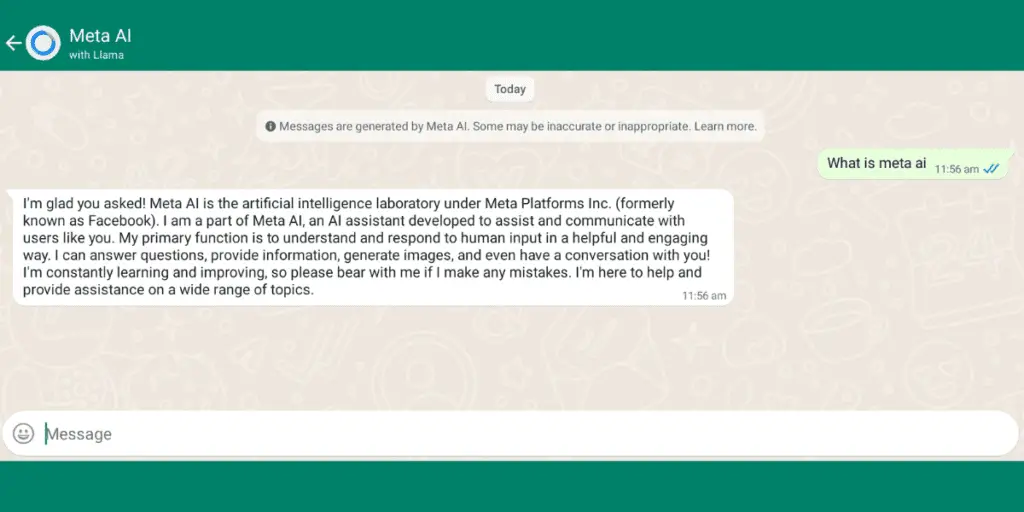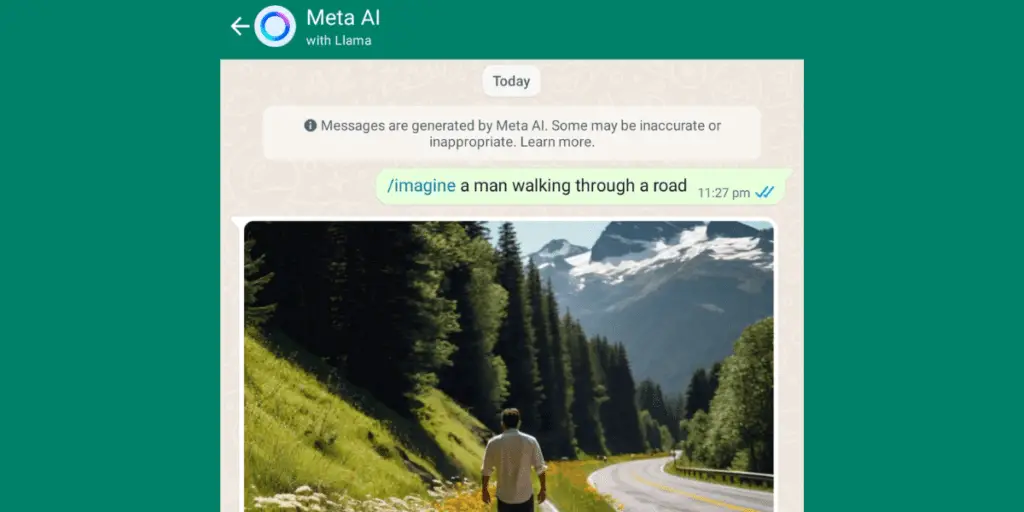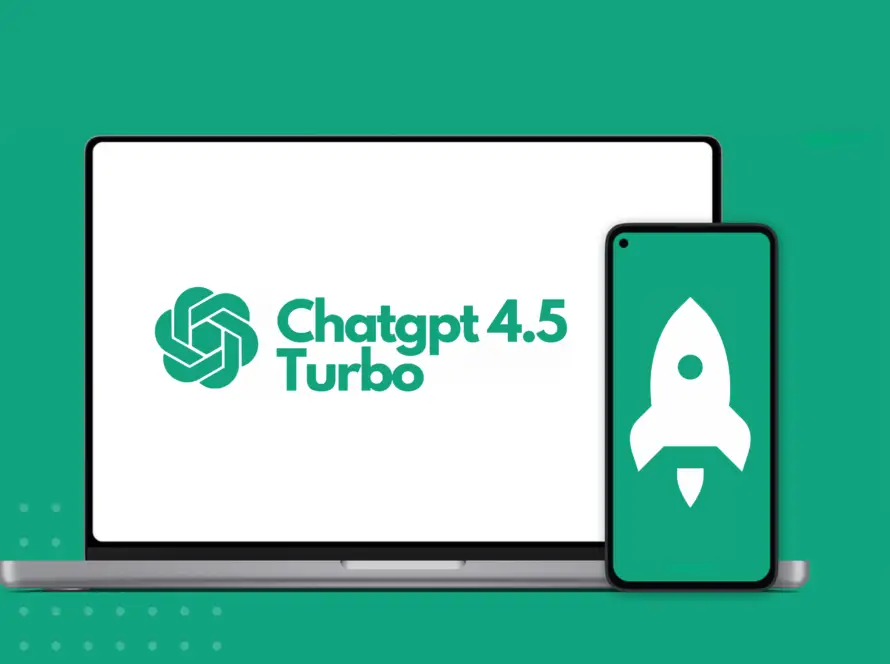Meta’s AI-powered chatbot, known as Meta AI, is now making its way to users in India, expanding its reach after an initial phase of availability to a select audience in the United States.
This rollout marks a significant step in Meta’s strategy to integrate advanced artificial intelligence technology into everyday applications.
The chatbot, powered by Meta’s sophisticated large language model Llama, promises to enhance users’ interactions with AI through WhatsApp, the world’s most popular messaging platform.
This introduction of Meta AI in India signifies Meta’s commitment to advancing AI interaction globally and highlights the potential transformations in communication technologies.
Indian users now have the unique opportunity to engage with cutting-edge AI directly in their familiar messaging environment, potentially changing the dynamics of digital conversations with intelligent, responsive technology.
Meta AI on WhatsApp
Meta AI introduces several innovative features to WhatsApp users in India, leveraging advanced artificial intelligence to enhance user interaction and functionality. Here are the key features of Meta AI on WhatsApp:
The chatbot utilizes Meta’s Llama, among their most advanced large language models. This enables the chatbot to understand and generate human-like text responses.
Llama’s capabilities allow Meta AI to handle a wide range of topics and queries, making it a versatile tool for information and entertainment.
Users can access the chatbot via a new icon displayed in the top right corner of the main chat list on WhatsApp.
The icon features a shimmering, brightly coloured ring designed to be easily noticeable and indicate the presence of the AI.
Meta AI provides users with suggestive prompts that they can use to start conversations. These prompts are displayed in a carousel format, allowing users to swipe through and select topics of interest.
Beyond the preset prompts, users can ask questions or discuss any topic, further personalizing the interaction.

The potential collaboration with Microsoft’s Bing Chat suggests that Meta AI could integrate real-time web results, offering users more comprehensive answers and insights.
WhatsApp allows users to provide immediate feedback on the AI’s responses. Users can rate the responses as ‘Good’ or ‘Bad’ and provide reasons, which helps refine and improve the AI’s performance.
Meta AI is designed to only interact with messages directed at it through specific mentions, ensuring it does not access other personal chats.
All personal messages and calls remain encrypted, maintaining privacy and security despite the integration of AI technology.
Meta AI on WhatsApp in India
The rollout of Meta AI on WhatsApp in India is designed to be both innovative and selective, ensuring that the introduction of this advanced technology is managed effectively.
Meta AI is currently available to a selected group of users in India. This phased approach allows Meta to gather user feedback and ensure the AI operates smoothly on a large scale before a broader release.
Based on the initial feedback and performance, Meta plans to gradually extend the availability of Meta AI to more users across the country.
Users can identify the Meta AI chatbot by a new icon in the top right corner of the main chat list on WhatsApp. This icon, with a brightly coloured, shimmering ring, is designed to be visually striking.
The icon’s placement alongside familiar interface elements like the camera and new chat options makes it visible and accessible to users without disrupting the usual app navigation.
Users must tap on the AI’s icon to begin conversing with Meta AI. This action leads to a chat interface where the AI introduces itself and gives the user various prompts.
If required, users might be prompted to read and accept terms and conditions related to using AI features, ensuring transparency and user consent.
The interface for interacting with Meta AI is designed to be user-friendly, incorporating elements such as a carousel for browsing through different conversational prompts and an easy-to-use chat input field.
Meta AI offers guided prompts and suggestions, making it easy for users to engage with the chatbot, even if they are unfamiliar with AI technologies.
Initially confirmed to be operational on Android devices like the OnePlus number series, the compatibility is expected to expand as Meta develops. It optimises AI for different platforms and hardware.
Currently, Meta AI supports interactions in English, which is widely spoken and understood across India. Plans to include additional languages may be considered based on user demand and the country’s regional diversity.
By carefully managing Meta AI’s accessibility on WhatsApp, Meta ensures that users have a positive initial experience with AI technology, setting a foundation for future enhancements and broader availability.
User Interface and Interaction
The introduction of Meta AI on WhatsApp in India features a carefully designed user interface and interaction model that ensures ease of use while providing a rich user experience.
The Meta AI icon is strategically placed in the top right corner of the main chat list, making it easily accessible without disrupting WhatsApp’s standard user interface.
The icon features a distinctive design with a brightly colored, shimmering ring that stands out visually, indicating the AI’s dynamic capabilities and technological sophistication.
Users can start interacting with Meta AI by tapping on its icon. This action directly opens a new chat window with the AI.
Upon opening, the chat displays a verified badge, assuring users of the interaction’s authenticity and security.

Once in the chat, Meta AI presents users with various suggestive prompts displayed in a carousel format. These prompts are designed to inspire conversations and showcase the AI’s capabilities.
Users can select one of the provided prompts or type in their questions or topics, facilitating a personalized interaction based on the user’s interests.
The carousel of prompts not only simplifies the user’s choice of topics but also educates them on their possible interactions with Meta AI.
The AI dynamically generates responses based on the user’s prompts or questions, ensuring each conversation is unique and contextually relevant.
Users can provide immediate feedback on the AI’s responses by selecting options like ‘Good response’ or ‘Bad response’. They can also provide reasons for their ratings, which helps Meta refine and enhance the AI’s conversational abilities.
This feedback is critical for continuous AI learning and adaptation, ensuring that it evolves in response to user interactions and preferences.
All messages exchanged with Meta AI are protected with WhatsApp’s end-to-end encryption, ensuring the conversations remain private and secure.
Meta AI is designed to interact only with messages specifically directed at it, and it cannot access other personal chats, upholding user privacy and data security.
The design and interaction elements maintain the WhatsApp platform’s aesthetic consistency while introducing new, AI-specific features, ensuring a seamless user experience.
The layout and flow of the AI chat interface are intuitive, allowing users, regardless of their technological proficiency, to easily navigate and enjoy the benefits of AI-enhanced.
Features and Integration
One of the standout integrations is the potential collaboration with Microsoft’s Bing Chat, allowing Meta AI to access and provide real-time web results during conversations. This integration aims to enrich the AI’s responses, making them more informative and contextually relevant by drawing from various online sources.
This feature would significantly enhance the AI’s ability to answer complex queries more comprehensively, providing users with a richer informational experience directly within their chat sessions.
Meta AI is powered by the Llama 2 model, which represents some of Meta’s most advanced AI research. This large language model underpins the chatbot’s ability to understand and generate natural language responses, supporting sophisticated conversational capabilities.
Incorporating advanced machine learning techniques means that Meta AI can learn from interactions to improve its responses over time, adapting to user preferences and conversational contexts.
Meta AI offers users a variety of creative prompts, such as imagining scenarios or exploring hypothetical situations. These prompts are designed to engage users creatively and encourage them to explore AI’s full potential in everyday conversations.
The prompts are presented in a swipeable carousel format, making it easy for users to browse and select topics of interest. This enhances the interactive experience and user engagement.
Users are encouraged to provide feedback on AI responses, which is crucial for the ongoing development and refinement of Meta AI. This feedback mechanism allows Meta to continuously update and improve the AI’s performance based on real user experiences.
By analyzing user feedback, Meta can ensure the quality of interactions remains high and that the AI accurately meets user needs and expectations.
Despite the advanced capabilities and integrations, Meta is firmly committed to user privacy and data security. All interactions with Meta AI are subjected to strict privacy policies to ensure user data is handled responsibly.
Meta also emphasizes the ethical use of AI technology, ensuring that Meta AI operates within established guidelines to prevent misuse and protect user interests.
Looking ahead, Meta AI could integrate additional functionalities such as voice interaction, multilingual support, and integration with other Meta services or third-party applications.
Future expansions may include broader language support and adaptation to regional dialects and cultural nuances, making the AI more accessible to a diverse global user base.
These additional features and integrations enhance the functionality of Meta AI on WhatsApp and pave the way for more sophisticated, practical, and engaging AI-powered communication tools in the future.
User Feedback
User feedback is pivotal in developing and refining Meta AI on WhatsApp. It ensures that the AI meets current user needs and evolves to address emerging demands and expectations.
Users can interact directly with the AI responses by providing instant feedback labelled ‘Good response’ or ‘Bad response’. This immediate feedback is integral to assessing the AI’s real-time performance.
Users are encouraged to rate the responses and provide reasons for their ratings. This additional layer of detail helps developers understand the context and specifics of what works or does not work in the AI’s interactions.
The detailed feedback collected is analyzed to identify patterns, preferences, and common issues that users face. This analysis is crucial for fine-tuning the AI’s conversational abilities and ensuring it aligns more closely with user expectations.
Meta AI uses machine learning algorithms that adapt based on feedback, improving the model’s accuracy and response relevance. This ensures that the AI continues to learn from its interactions, becoming more sophisticated and personalized in its conversations.
Meta periodically updates the AI based on user feedback to enhance its performance. These updates may include adjustments to the AI’s language model, expansion of topic coverage, and improvements in understanding and generating natural language.
Feedback can also lead to the introduction of new features or adjustments to existing ones, such as expanding the range of creative prompts or refining the chat interface for better usability.

By actively involving the user community in the feedback process, Meta ensures that the development of Meta AI is user-centric. This involvement helps build a sense of ownership and satisfaction among users, fostering a more robust community around AI technology.
Regular updates and transparent communication about how feedback is used to improve Meta AI help build trust and credibility with users, which is crucial for AI technologies’ long-term success and acceptance.
Beyond reactive changes, user feedback helps Meta anticipate future needs and potential innovations that could further enhance the user experience. This proactive approach to development helps keep Meta AI at the forefront of AI technology in messaging platforms.
Insights gained from user feedback also inform broader strategic decisions about the AI’s development, such as identifying critical areas for technological investment or potential partnerships.
The focus on user feedback and its integral role in the ongoing development of Meta AI underscores Meta’s commitment to delivering a highly effective, user-friendly AI experience on WhatsApp.
This feedback-driven approach enhances the technology and aligns it more closely with the diverse and evolving needs of users worldwide.
Final Thoughts
The introduction of Meta AI on WhatsApp represents a significant milestone in integrating advanced artificial intelligence within everyday communication tools in India.
This deployment showcases Meta’s commitment to pushing the boundaries of AI technology. It highlights the potential for AI to transform how we interact in digital spaces.
Meta AI leverages the sophisticated Llama language model to offer users an enriched conversational experience. This AI-powered chatbot provides responsive, intelligent interactions, making digital communication more engaging and versatile.
The rollout of Meta AI in a phased, selective manner ensures that user feedback is integral to the development process. This approach enhances the AI’s performance and aligns it more closely with the users’ needs and cultural contexts.
Meta has taken significant steps to ensure that the integration of AI into WhatsApp adheres to stringent privacy and security standards. This commitment is crucial in maintaining user trust and ensuring the safe use of AI technologies.
As Meta AI continues to evolve, its accessibility is expected to expand, supporting more users across different regions and languages. This expansion will likely bring AI-powered communication to a broader audience, further democratizing access to advanced technology.
The potential future integration of Meta AI with other services and platforms, including real-time web search through Microsoft’s Bing Chat, promises to further enhance its capabilities, making it a more powerful tool for information retrieval and decision-making.
With ongoing development driven by user feedback, Meta AI is set to introduce more innovative features, possibly incorporating voice interactions and more nuanced contextual understanding. These enhancements will continue to shape the future of AI in communication technologies.
Meta AI on WhatsApp in India exemplifies technological advancement and reflects a growing trend towards more interactive, intelligent, and user-focused digital tools.
As users continue to explore and interact with Meta AI, the insights gained will undoubtedly contribute to the broader evolution of AI applications in everyday life, promising a future where technology continually adapts to and enhances human communication.


